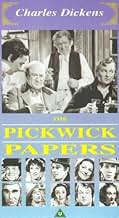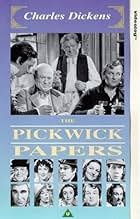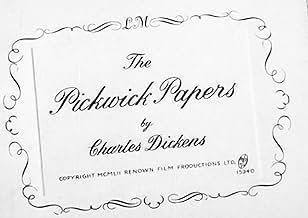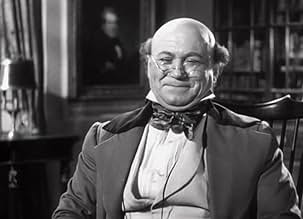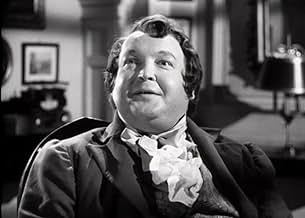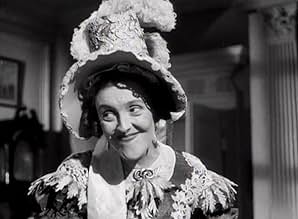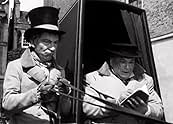Füge eine Handlung in deiner Sprache hinzuFour wealthy Victorian gentlemen led by Samuel Pickwick set forth on an objective study of human behavior, thwarted by con artist Mr. Jingle and one of his schemes leading to Pickwick being ... Alles lesenFour wealthy Victorian gentlemen led by Samuel Pickwick set forth on an objective study of human behavior, thwarted by con artist Mr. Jingle and one of his schemes leading to Pickwick being put on trial for breaking a promise to marry.Four wealthy Victorian gentlemen led by Samuel Pickwick set forth on an objective study of human behavior, thwarted by con artist Mr. Jingle and one of his schemes leading to Pickwick being put on trial for breaking a promise to marry.
- Regie
- Drehbuch
- Hauptbesetzung
- Für 1 Oscar nominiert
- 2 Nominierungen insgesamt
Empfohlene Bewertungen
Not in the same league as the David Lean-directed 'Great Expectations' and 'Oliver Twist' which preceded it, this film, directed by Noel Langley, is nevertheless not bad. It is entertaining, with an excellent cast ranging through character actors such as James Donald, Hermoines Baddeley and Gingold, Nigel Patrick, and William Hartnell; through to scene stealers like Joyce Grenfell.
It distills rather a wordy novel well, and provides it with the language of cinema to get the point across. Not an expensive production, but with some nice touches, such as Kathleen Harrison's twitchy Rachel; Mr Jingle's deck of cards; the runaway horse; and an early display of outraged bluster from Hattie Jacques, which she would repeat two decades later as a member of the Carry On team.
"Pickwick" is about 850 pages long, and has a shaggy dog construction. Dickens wrote a picaresque novel here, with the Pickwick Club members exploring England, and falling into many misadventures. They are supposed to be sending papers back to their club about their adventures, for they are a learned society. In one great moment in the novel (but not in the movie, unfortunately), they think they find a curiosity - a stone with the words "Bilst umpshi mark +). Their paper on this gains them immense public adulation for their scholarship, but one critic (who is kicked out of the Pickwick Club) investigates and says it should say "Bill Stumps, his mark "+". Nobody cares about the nay-sayer.
One aspect of the novel that is not in the film was Dickens addition of about seven or eight short stories the group hears or reads while on their tours. Dickens wanted to vary his novel, and he would do this again in "Nicholas Nickleby" briefly at the start of that novel. In 1841 Dickens began a large scale literary project called "Master Humphrey's Clock" in which Master Humphrey and his friends (including Samuel Pickwick, Sam Weller, and Tony Weller) tell stories, but two of the stories expanded into full scale novels: "The Old Curiosity Shop" and "Barnaby Rudge". After "Master Humphrey's Clock" Dickens never again wrote a book of just short stories (his "Christmas Novels" were not written and published together but over the years). An occasional short story like "Hunted Down" was published on its own.
The film is a nice distillation of the best sequences in the novel, such as the great lawsuit of "Bardell v. Pickwick" (Dickens first magnificent swipe at British law). Of particular notice in the film is the performances of Nigel Patrick as the trouble making scamp Jingle, and James Hayter as Pickwick (his only real starring role). Jingle (who's dialog looks like a telegram in the novel)is played as a charming rogue by Patrick. When he nearly gets Mr. Winkle (James Douglas) into a duel with two dyspeptic military doctors (with the immortal names of "Dr. Payne" and "Dr. Slammer"), after one diatribe from them Patrick riffles a deck of cards like a "Bronx Cheer". Hayter, a popular character actor in British film and television, had a smooth and warm sounding voice, and (in observing prison conditions) makes the phrase "How pitiable" actually sound correct for the first time. It is not the complete novel - which you should read and enjoy - but it is a nice introduction to it.
Wusstest du schon
- WissenswertesAlthough the film was released in England in 1952 and opened in New York in 1954, it was not nominated for Oscars until 1956, due to its not having played in Los Angeles until then.
- PatzerThe pony trap shown outside the coach-house is not the same pony trap that Mr Pickwick and others are seen riding on in the next scene.
- Zitate
Nathaniel Winkle: Gentlemen, Mr. Jingle is the viper in our midst.
Samuel Pickwick: Viper?
Nathaniel Winkle: Viper, sir.
Tracy Tupman: Nonsense, Winkle.
Samuel Pickwick: Nonsense, Winkle.
Augustus Snodgrass: N-nonsense, Winkle.
Nathaniel Winkle: Very well, then... we shall see.
- Crazy CreditsClosing credits finish with The End of The Pickwick Papers
- Alternative VersionenAlso available in a colorized version.
- VerbindungenFeatured in Arena: Dickens on Film (2012)
Top-Auswahl
- How long is The Pickwick Papers?Powered by Alexa
Details
- Erscheinungsdatum
- Herkunftsland
- Sprache
- Auch bekannt als
- The Pickwick Papers
- Drehorte
- Nettlefold Studios, Walton-on-Thames, Surrey, England, Vereinigtes Königreich(studio: produced at)
- Produktionsfirma
- Weitere beteiligte Unternehmen bei IMDbPro anzeigen
- Laufzeit1 Stunde 49 Minuten
- Farbe
- Seitenverhältnis
- 1.37 : 1
Zu dieser Seite beitragen


